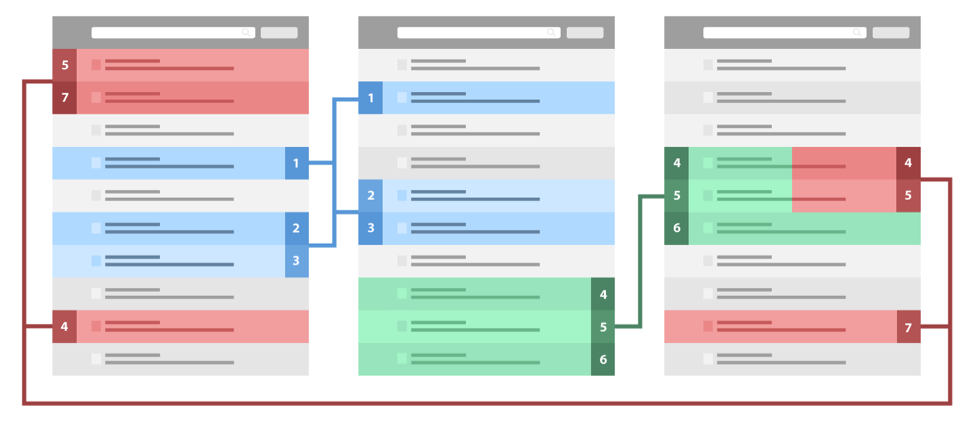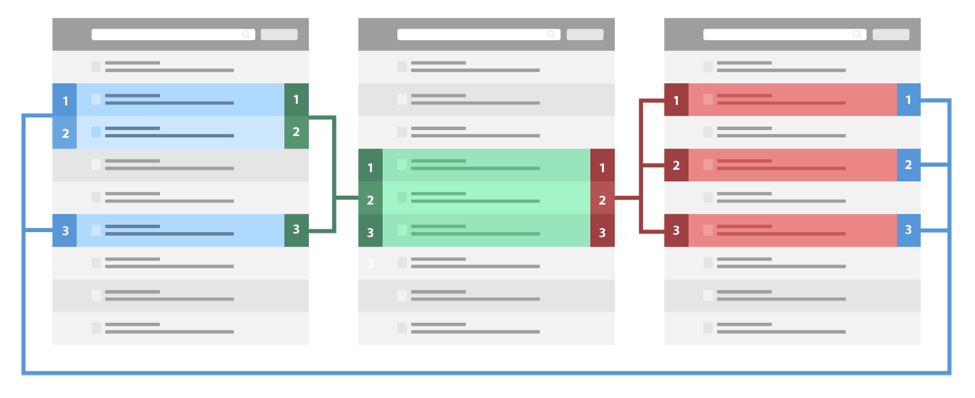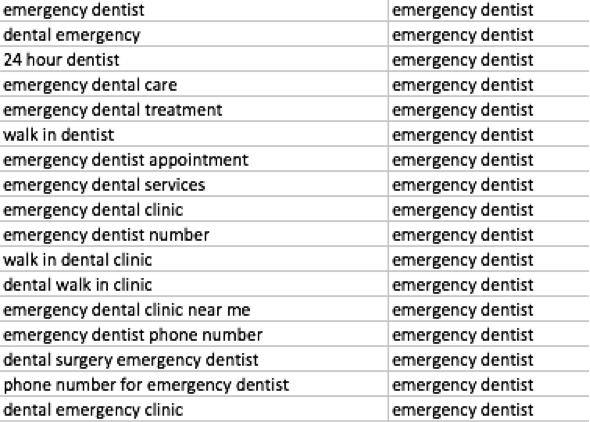For the last two years since the Google Hummingbird update, there’s been a lot of talk around topics over keyword optimization. This is because, with the recent updates, Google is getting better at determining the searcher’s intent. The search itself becomes more and more efficient by adapting to the searcher. Now Google claims to understand the semantics and relevant topics.
But what does it mean for SEOs?
The SEO world has broken into two camps. We have a smaller and more radical group and a bigger and a more (to my mind) reasonable one.
The first camp proclaims “topics over keywords” to be a new and the only possible future. Those guys urge marketers to abandon keywords and trust in content and concepts only.
The other camp is far less drastic. They say the future of SEO is really for topics, but… First, it’s yet to come. Second, Google will most likely never completely abandon keywords. So, what we have to do is to shift our primary focus of keywords and turn to topics.
But! We need to combine it with even more thorough and high-grade keyword research. I myself completely prefer the second hybrid strategy, and here’s why.
- We need to consider that incorporating topics is yet “in beta.” Google tells about it themselves
- That’s why topic targeting doesn’t work in the same way for all the concepts
- Keywords are an effective basis for an SEO strategy; you don’t need to focus on them, but they can help you build up topics.
After all, the best way to boost your SEO productivity is to combine new-school concept targeting and good old keyword research.
But is keyword research really “old-school”?
Sure thing, but it’s far from dying. It’s changing and developing rapidly and new trends emerge here and there. So, let’s sum it up.
Don’t have your head in the clouds: keyword research is too powerful a tool to just give up on it. What we need to do is:
- Think keywords but mean topics
- Use all the newest trends in keyword research.
In this article, I’ll tell you about one of the most promising keyword research techniques that can help bring topic targeting to a new level.
What is a keyword clustering?
Keyword clustering is an automated segmentation of keywords into relevant groups. “Relevance” may depend on the tool, custom settings, and your needs. As you might have figured out already, there are two key points. Both can either attract you or repel:
- It’s made by a tool (unfortunately, you can’t run clustering yourself)
- It’s fully automated.
The pros and cons are evident. On the one hand, you rely on the proven algorithms and save tons of time that you can devote to writing quality content, for instance.
On the other, you can’t control the process yourself and as everyone knows each tool requires a bit of double-checking and after work. So, at this point, you can either close the page and don’t give it another thought or go on reading. After all, we all use tools.
How does clustering work?
As I’ve already explained, the keyword clustering (or, simpler, the keyword grouping) would break your keyword list into small groups of keywords related to each other. But how are those keywords relevant to each other?
That’s a good question because there are different types of keyword grouping. Let’s quickly look through them.
Lemma-based keyword grouping (lemmatization)
Lemma is a base or dictionary form of a word (without inflectional endings). In linguistics, lemmatization is a process of grouping together the different inflected forms of a word so they can be analyzed as a single item.
What is in it for SEO?
In short, it will work like this:
- The tool will take your keywords
- Break them down to the lemmas
- Find keywords with the same lemmas
- Group them together
Here’s a fragment of the list you’ll finally get:

SERP-based keyword clustering
SERP based keyword grouping should be of primary interest for those who want to implement topic targeting. As you might have guessed by the title, the keywords will be segmented into groups based on the search results. In particular, on the TOP 10 of the search results.
Here’s a detailed four-step algorithm:
- The tool takes keywords from a list and sends them as the queries to the search engine. Then it scans the TOP 10 results for each keyword.
- If the search engine displays the same web pages for different keywords and there are several matches, these keywords will be banded together.
- The number of matches that triggers grouping of two different keywords (clustering level) is customizable.
- The keywords that revealed no matches in the search results are segmented into a separate group.
The TOP 10 based keyword grouping has three different types. The type affects the way keywords in the groups are linked to each other.
SOFT Clustering
The Clustering Tool picks the most popular keyword and compares TOP 10 search results for this keyword with TOP 10 results for other keywords by the number of matching URLs in TOP 10. If the number of matching URLs matches the selected grouping level, these keywords are banded together. All keywords within a group will be related to the most popular keyword, but they will not necessarily be linked to each other (will not necessarily have matching URLs).

MODERATE Clustering
The Tool picks the most popular keyword and compares the TOP 10 search results for this keyword with TOP 10 results for other keywords by the number of matching URLs in TOP 10. At the same time, it compares all keywords to each other. If the number of matching URLs matches the selected grouping level, these keywords are banded together. Each keyword within a group will have a related keyword with matching URLs, but two different pairs of keywords will not necessarily have matching URLs.

HARD Clustering
The Tool picks the most popular keyword and compares TOP10 search results for this keyword with TOP10 results for other keywords by the number of matching URLs in TOP 10. At the same time, it compares all keywords to each other and all matching URLs in the related pairs. If the number of matching URLs matches the selected grouping level, these keywords are banded together. All keywords within a group will be related to each other and will have the same matching URLs.

The central question is: how can keyword grouping help you to adapt to the topic targeting? Enrich your website with keywords without keyword stuffing
- Strong content. Content is the main goal above all else, but combining strong content with quality keyword research offers a huge advantage.
If you decide to meddle in topic targeting, avoid two common mistakes many people make:
- Simply stuffing your precious content with different word forms of the same keywords or phrases
- Optimizing each webpage for one keyword
Forget it and move on. We will need different high-quality keywords for different web pages. That’s where SERP-based keyword clustering may help you, which isn’t married to word forms or synonyms. (It doesn’t mean, of course, that clustering tools will skip synonyms but they don’t focus on them.)

Clustering allows groups of different keywords to be linked by a common topic. These keywords will allow you to incorporate higher-quality and more organic content. Here’s a fragment of a clustered keyword list for private dentistry.
That’s what a searcher expects to see when he or she Googles “emergency dentist.” This may also give you an idea of what content you should add to this page.
2. Think like Google
So, Google says quality content is key to successful optimization. We are all for it. But we should never forget that sometimes good content is not enough to rank high. Why? Because a searcher’s need and quality are two equally important yet different things. So, apart from just writing good articles or workshops, we should know what our visitors are looking for, and we should create content that our potential customers want. How can you do it?
- Hire an experienced content manager
- Research customer demands
- Update your old content to make it higher in quality
All of this will play into your hand, but what if we could simply think like Google? We know Google algorithms are meant to fit the searcher’s needs. Google engineers are doing a good job trying to get closer to perfection.
So, what if we just could use what they’ve already done to know what our clients want? We can consider ourselves lucky because SERP-based keyword grouping brings us closer to it than ever.
Do you remember how it works? It scans the search results and figures out what keywords according to Google should be on the pages displayed for a certain search query.
Basically that means keyword clustering will show us which keywords according to Google are expected to be on the same page. This is almost equal to which keywords a user expects to find on the same page.
- Structure your content
Keywords don’t have to be flesh and bones but they can be a solid foundation for quality content. I guess nobody will argue that building your content on the basis of quality keywords allows for superb results.
So, that’s our four-step plan:
- Grab keywords
- Run clustering
- Figure out ideas for future content
- Perfect and structure your content
Clustering would be extremely helpful if you are planning to hire a content manager. Even if you want to avoid any kind of keyword-targeted optimization, your keywords can help you form a structure of the contents.
Here’s a fine example of a keyword pool for a yoga-related website.

- Keep your enemies closer
It’s not a bad idea to fight your competitors with their own weapon. Keyword clustering will give you a picture of how your niche TOP 10 competitors manage and optimize their content and what keywords they use.
What are your options?
You can just take it into account OR you can use some of their keyword ideas to enrich your content.
Example: Imagine you have a plastic surgery clinic. No doubt if you search for rhinoplasty, you’ll see your competitors in the TOP 10. By analyzing what keywords they use in their content, you can figure out if a bit of keyword targeting would be helpful for your campaign.
Tip! A handy option of keyword clustering is that it allows you to narrow the results down to your location, so you can make sure you are dealing with “your” SERP.
- Focus on the content
Even though many marketers cringe when they hear about tools, nobody can deny that tools save tons of time. However, some say that by using tools, we sacrifice the quality for speed.
Let’s look deeper into the keyword clustering tools to figure out what quality/speed compromises we’ll have to make there.
So what about the speed first?
I’ve run a few tests myself and here are my results. A pool of 15,000 keywords was clustered within 15 minutes.
How reliable is it?
As reliable as Google itself. The tool pulls data from search engines. Honestly speaking, you can perform the same task yourself, but it would take a couple of working days.
Do you have to do anything yourself?
The moment the tool displays the results, it’s up to you to decide what to do with them. You can upload them into a file for further research. I personally recommend a bit of follow-up to figure out which keywords will suit your content best.
As you can see, Keyword Clustering will save time in the most reliable manner so you have more time to plan and create you content, for example.
Tip! Don’t forget to refurbish your old content to make sure it’s topic-oriented.
- Check if your topic targeting works
Last but not the least is self-control. We all know self-control and self-tracking are major parts of high-grade SEO.
As I’ve already mentioned, topic targeting is still a pretty vague and un-researched field. Google guys are constantly improving their algorithms. Anyway, they admit they have lots of work to do. That’s why some concepts can be recognized by Google and processed smoothly, whereas others still require a bit of keyword optimization.
Check yourself to see if you need to add some keywords.
- Regularly track your rankings to see where your website ranks. (Use any tool or do it manually, but make sure you keep a close eye on your rankings.)
- If you’re not satisfied with your results, think of updating your content with some keywords. Take your keyword pool. Run a Clustering tool.
- Use what Google thinks is the best keyword structure for your website.
If you do this task right, you’ll be able to catch up to those ahead of you. Don’t forget that you need to control your campaign on the regular basis.

The list is yet to be updated. As any new rising technology keyword clustering has a more promising potential than its original purpose.
Now it’s time for you to offer your ideas and share your thoughts here!
Sasha is a Head of Customer Care at Topvisor – a Thailand based All-in-one SEO platform for digital marketers. She is passionate about Digital Marketing and loves writing about SEO and Marketing Strategies.



